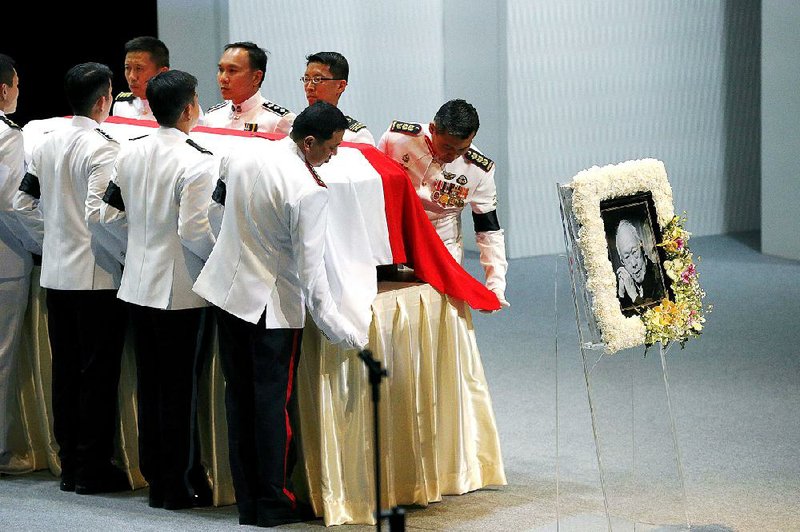SINGAPORE -- Singaporeans bid farewell to longtime leader Lee Kuan Yew on Sunday with an elaborate procession and a three-hour state funeral at which his son, the current prime minister, eulogized the statesman and declared that the wealthy city-state he helped build is his monument.
Undeterred by heavy rain, about 100,000 people lined a 9-mile route through the city to catch a glimpse of the funeral cortege. Lee's coffin, draped in Singapore's red and white flag and protected from the downpour by a glass casing, lay atop a ceremonial gun carriage that was led past city landmarks from Parliament to a cultural center where the state funeral was held.
"To those who seek Mr. Lee Kuan Yew's monument, Singaporeans can reply proudly: Look around you," Prime Minister Lee Hsien Loong said in the first of 10 eulogies at the funeral, which was attended by more than 2,000 people, including schoolchildren, Singapore's elite, world leaders and royalty.
Lee said an important part of his father's legacy is that "Singapore's voice is heard and we enjoy far more influence on the international stage than we have any reason to expect."
As the service neared its conclusion, civil defense sirens blared across the island to signal a minute's silence. The government had asked trains and buses to stand still. People gathered at a crematorium where a private cremation will be held, seeking a final glimpse of the cortege.
During a week of national mourning that began last Monday after Lee's death at age 91, some 450,000 people lined up for hours to briefly view the statesman's coffin at Parliament House. A million people visited tribute sites at community centers around the city.
The show of emotion is a rare event for Singapore and its 5.5 million people. The island nation, about four times the size of Washington, D.C., is known around the world as a wealthy trade and finance center with a strict social order that includes a ban on chewing gum and caning for some crimes.
Lee was Singapore's prime minister for more than three decades, ruling with an iron grip until 1990. He is regarded by Singaporeans as the architect of their nation's prosperity and harmonious relations among ethnic Chinese, Malay and Indian populations. But his authoritarian rule and crushing of dissent has also left a legacy of restrictions on free speech, a tame media and a stunted democracy.
"He did everything for us Singaporeans regardless of race, language or religion," said Jennie Yeo, a teacher who arrived at 7 a.m. to stake out front-row positions with two friends. "Education, housing, everything you can think of, he's taken care of for us."
Last week, lawmakers paid tribute to Lee in a special sitting of Parliament. Low Thia Khiang, the leader of Singapore's tiny political opposition, acknowledged Lee's role in nation-building in a brief speech, but said he did not believe one-party rule was the key to the country's economic development.
"Many Singaporeans were sacrificed during the process of nation-building and policymaking, and our society has paid a price for it," he said. "This is why Mr. Lee is also a controversial figure in some people's eyes."
Leaders and dignitaries from more than two dozen countries attended the funeral. The U.S. delegation was led by former President Bill Clinton. Others included the prime ministers of India, Japan and Australia.
Abroad, India declared a national day of mourning, and New Zealand government flags were at half-staff.
Lee's achievements and legacy are likely to be argued for years.
Though his widely read memoirs are titled From Third World to First, Singapore never knew grim poverty. Before independence in the first half of the 20th century, it was by the standards of the region a prosperous commercial hub of the British Empire.
But after its split in 1965 from a short-lived and acrimonious federation with Malaysia, Singapore's future was uncertain. It lacked natural resources, having to import even water, and was surrounded by hostile neighbors.
In control of all policy levers, Lee and his government obliterated independent trade unions, imprisoned political opponents, reconfigured the education system to produce workers who met the needs of foreign investors and pushed through other changes to make the island competitive.
Today, Singapore's GDP is among the highest in the world at $54,000 per person, according to the World Bank, and it consistently ranks at the top of surveys of competitiveness while other Southeast Asian nations lag far behind.
A Section on 03/30/2015

